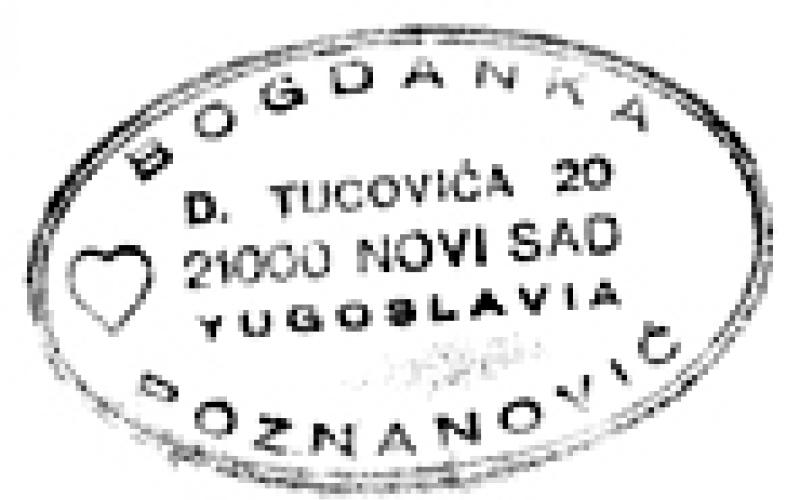Legacy of Bogdanka and Dejan Poznanović
Bogdanka and Dejan Poznanović were very important people on the Yugoslavian cultural scene in the last decades of the 20th century. With their work on the 'Youth Tribune', they represented the social integrators of the then cultural scene in Novi Sad with the cultural space of Yugoslavia and Europe. Poznanovićs was one of the founders of the 'Youth Tribune', which promoted new understandings in art and literature as opposed to the official propaganda of 'socialist realism. At that time, the 'tribune' was a meeting place for forbearers of new tendencies in culture, such as Vasko Popa, Oskar Davičo, Miodrag Pavlović, Branko Miljković, Tomaž Šalamun, Michelangelo Pistoleto, Marina Abramović, Slovenian, Macedonian, Croatian and artists from all over Yugoslavia. In the period from 1954, the Tribune was a place of integration of artists from Novi Sad and Vojvodina, whose critical and conceptual work influenced the formation of a unique cultural identity of this area. Among these artists are Slavko Bogdanović, Miroslav Mandić, Slobodan Tišma, Mirko Radojičić, Čeda Drča, Vladimir Kopicl, the Bosch + Bosch group, the OHO group, etc.
Bogdanka Poznanović was the editor of the 'Art Salon' at the Youth Tribune, which she completely opened to new artistic tendencies. At the same time, she developed her artistic career, which was initially focused on painting, and later introduced an interdisciplinary approach to her work, combining photography, concept and video expression. She is one of the first artists to deal with ‘Mail Art’ as a new, conceptual category. She perfected her work on numerous specialist trips and stays in various European and world institutions. She dedicated twenty years of her work to a professorial career at the Novi Sad Academy, where she established the subject of interdisciplinary research for the first time in the whole of Yugoslavia. Today he lives in Novi Sad.
Dejan Poznanović was the editor-in-chief of the literary magazine 'Polja' in the period from 1958 to 1962, at a time when the magazine was actively publishing the works of Slovenian, Croatian, Macedonian artists and artists from Vojvodina. He was actively involved in translation work from Slovenian, Macedonian and Russian. In his translation, the plays 'Congress' by Primož Kozak (1969) and 'Liberation of Skopje' by Dušan Jovanović (1979) were performed at Sterija's Pozorje. He was the first to translate texts from the Slovenian language about the work of the conceptual group 'OHO', which influenced their promotion and connection with other tendencies of conceptual art in the former Yugoslavia. He published his literary work in numerous magazines, including Delo, Student, Vidici, Politika, Polet, Borba, Književnost, Književna Reč, Scena, Književne novine, Letopis Matice srpske, etc. He died in 1996 in Novi Sad.
The individual work within the 'Youth Tribune' of Bogdanka and Dejan Poznanović had a distinct integrative role. Their versatile engagement connected and created a contemporary cultural space, the authenticity of which is preserved in the rich documentation of events, exhibitions, discussions, performances, actions, conversations, etc.
The legacy of Bogdanka and Dejan Poznanović is the only material that testifies to this fruitful period of our cultural past. The legacy contains a large number of authentic books and catalogs, books with personal dedications, letters, photographs, negatives, slides, videotapes, SVHS, VHSC and audio tapes, records, photocopies, original works of art, etc. One part of the legacy (a total of 658 titles) of Dejan and Bogdanka Poznanović is already in the kuda.org library and media library. It is thus enriched with exclusive, authentic and rare materials (catalogs, books, photocopies) that have not been available to the public so far, and which are the only specimens of that kind in our area. The legacy covers the period of artistic practice and theory of the 1960s and 1970s in our country, region and Europe. The documentation is unique insignificant events, such as the participation of our conceptual artists at the Paris Youth Biennale in 1971, Joseph Beuys' lecture at the SKC in Belgrade, or street performances, actions and alternative forms of theater performed in Novi Sad, etc. Keeping and promoting the legacies of Bogdanka and Dejan Poznanović is a long-term project that will make this unique material available to the public. After its takeover, it is necessary to carry out several steps: its systematization, processing and archiving, which will contribute to the availability of legacies to a wide circle of people.


